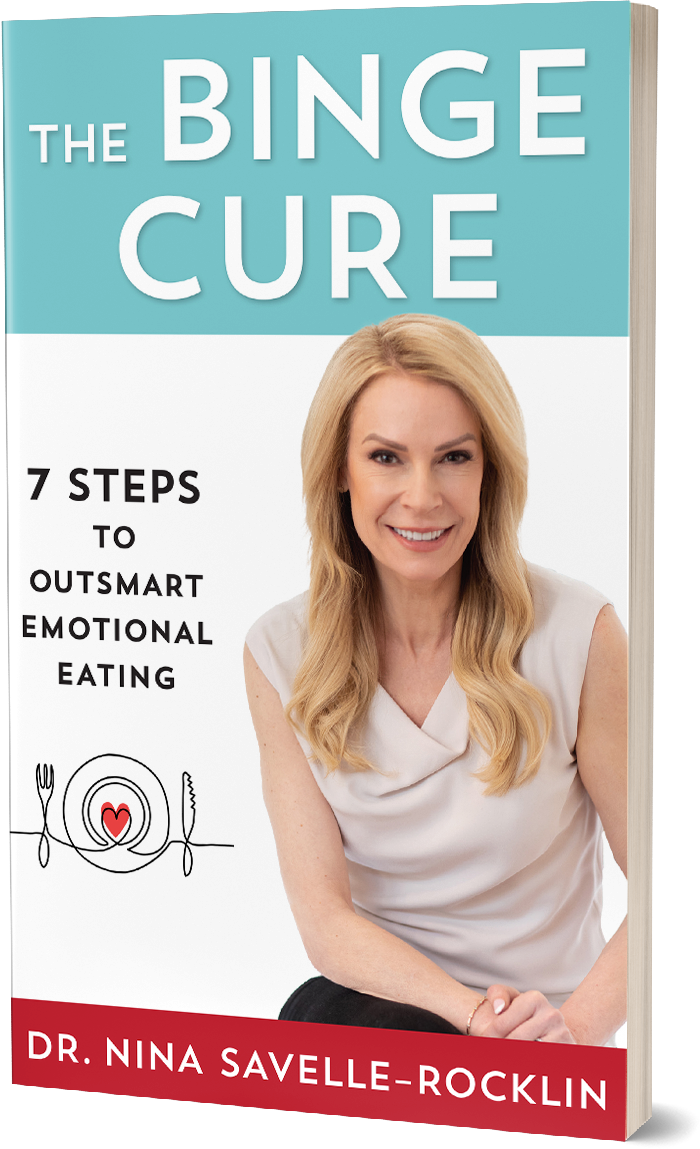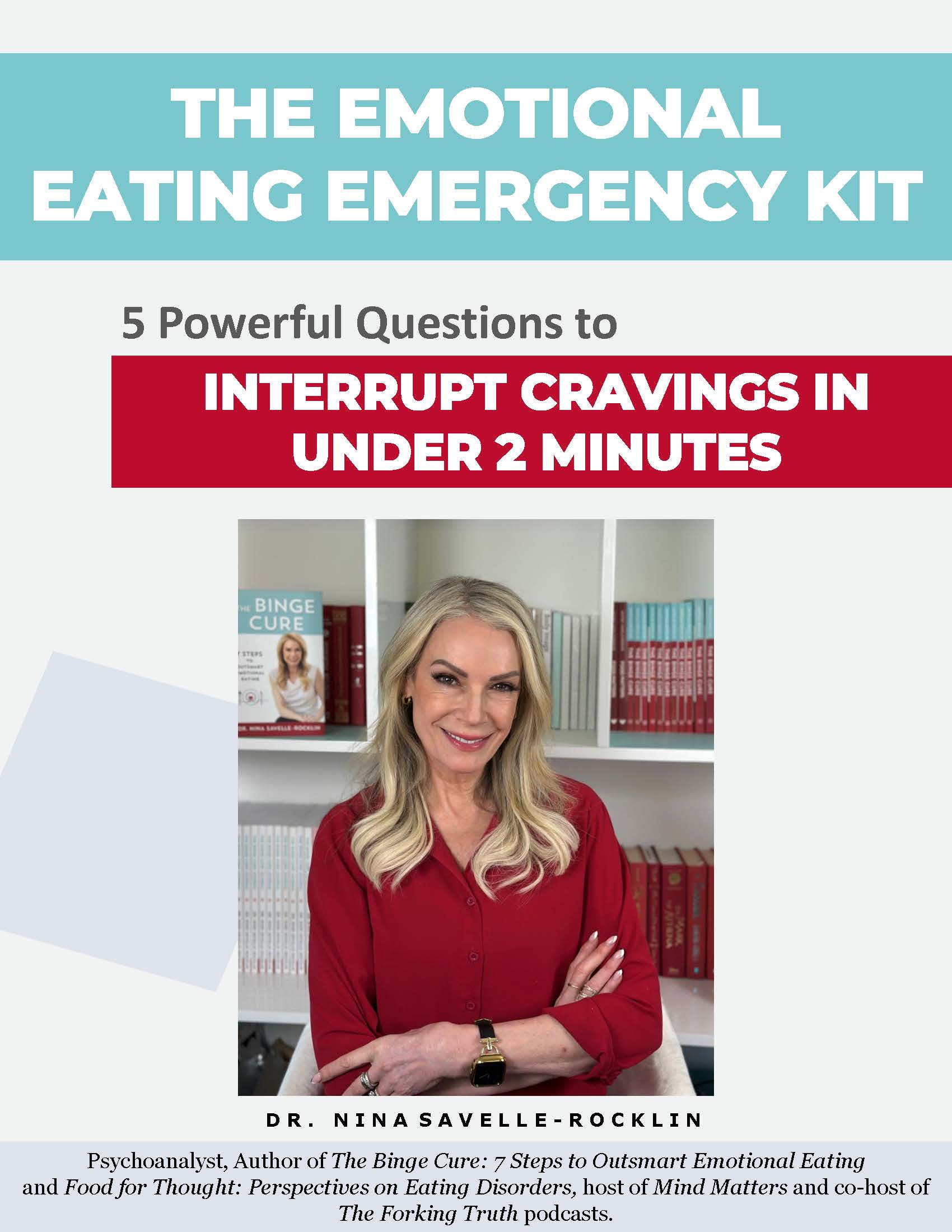Dr. Nina Savelle-Rocklin
Breaking Free from the When-Then Trap: A Path Towards Authentic Happiness
Table of Contents
- The “when-then” trap can be harmful for several reasons:
- The fallacy of conditional happiness
- How to break free from the when-then trap
The “when-then trap” is a term referring to the mindset of setting conditions for happiness or satisfaction.
We think that “when” a certain event or circumstance occurs, “then” we will be happier, more fulfilled, and successful. This applies to various life situations, whether it’s reaching a desired weight, achieving a career goal, finding a romantic partner, or buying a dream car or home.

The when-then trap shows up in many aspects of our lives, including in our relationships, careers, personal development, and definitely in our relationship with food and body image. Here are some examples:
Career and Personal Success: “When I get that promotion, then I'll be satisfied with my career.” This leads to constant dissatisfaction in the present job role and ignores any current accomplishments or growth.
Financial Status: “When I save up $10,000 or $100,000 or a million dollars, then I'll feel secure.” This results in a constant feeling of financial insecurity, even if your current situation is stable.
Relationships: “When I find a romantic partner, then I'll feel complete” or “When I get married, or have a baby, or have another baby, then I’ll be happy.”
Health and Fitness: “When I can run a marathon, then I'll consider myself a real runner.” This diminishes all your current achievements and progress, promoting feelings of inadequacy.
Appearance: “When I lose 20 pounds, then I'll feel attractive and I’ll be ready to date.” This mindset fosters or reinforces negative body image and low self-esteem.
In relation to weight loss, the when-then trap is particularly insidious. For example, thinking “When I lose weight, then I'll be happy” not only puts off happiness to some undermined time in the future, but it also creates an unhealthy association between body weight and happiness.
Similarly, thinking “When I have a perfect body, then I'll love myself” can lead to low self-esteem, body dissatisfaction, and potentially harmful behaviors aimed at achieving an idealized body.
There is no such thing as perfection with bodies. This also reinforces the belief that self-love and acceptance are conditional and that you have to look a certain way to deserve love and acceptance–even from yourself.
If you have thoughts like, “When I stop bingeing, then I’ll feel good about myself” that puts the focus on the behavior itself, ignoring the reasons that contribute to bingeing or to other forms of disordered eating.
The “when-then” trap can be harmful for several reasons:
Continual Dissatisfaction: Because the mindset of the “when-then” trap inherently places happiness in the future, satisfaction with the present moment is often diminished. It creates a constant feeling of lack or not having enough because you're always looking forward to something else for fulfillment.
Overemphasis on External Factors: The “when-then” trap often relies on external circumstances, achievements, or validation for happiness. This means you're outsourcing your happiness to factors beyond your control, making it unstable and dependent on these external conditions.
Less Enjoyment and Appreciation of Life: With the focus always on the future, there's a tendency to overlook or undervalue present experiences and achievements. This diminishes your capacity to enjoy the present and appreciate what you already have.
Potential for Increased Stress and Anxiety: By attaching happiness or self-worth to specific outcomes, the “when-then” trap can add unnecessary pressure, leading to increased stress and anxiety.
If you use food to cope, it can be a vicious cycle. You think you’ll be happy “when” something changes, which causes anxiety or depression, and that can make emotional eating worse if it’s the primary response to difficult emotions.
Perpetual Cycle of Deferral: The “when-then” trap leads to a never-ending cycle. Even if the “when” condition is met, the satisfaction is often temporary, and a new “when-then” condition replaces the old one. As a result, true happiness always feels out of reach, perpetually deferred to some future time or circumstance.
Distorted Reality: The “when-then” trap often involves idealized conditions for joy. This can lead to a distorted perception of reality and unattainable expectations, which can lead to disappointment when the reality doesn't match the idealized future.
While goal setting is important and can provide motivation, the when-then trap can lead to a cycle of perpetual dissatisfaction, as happiness is constantly projected onto future events, moving further out of reach each time a condition is met.
Amy's Journey
Amy had a successful career and a supportive family, yet she constantly found herself stuck in the “when-then” trap. She believed that when she lost weight, she’d be happier in all aspects of her life. She’d feel good in her body, happier in her marriage, and even thought she’d be more respected at work.
This belief had led Amy to try every weight loss program there is, from Weight Watchers to intermittent fasting. She’d lose weight and then inevitably regain the weight, plus more, and end up frustrated and upset at herself.
We looked at Amy's belief that she would be a more lovable person when she was thinner. We challenged this notion and worked on her self-definition and self-esteem so that Amy eventually could feel good about herself even though she felt bad about her weight.
Amy focused less on weight loss and more on gaining self-esteem. Amy was finally able to break free from the “when-then” trap, understanding that her worth and her happiness were not dictated by her weight.
She learned new ways to respond to herself and changed her negative self-talk to something more encouraging. Eventually, she lost weight–but it was a result of new habits and a healthier mindset, and because of that, she kept it off. There are several reasons why so many of us might fall into the when-then trap:
1. Cultural Conditioning: Many societies and cultures encourage future-oriented thinking, particularly around achievement and success. From a young age, we're often taught that we need to work towards future goals (like getting good grades, going to a good college, or getting a good job) in order to be happy or successful.
2. Coping Mechanism: The when-then trap can also be a form of emotional coping mechanism. By focusing on a hopeful future, we distract ourselves from present difficulties or dissatisfaction. It's a way of managing our current unhappiness by believing it's temporary and will end once a certain event happens.
3. External Validation: Sometimes, the when-then trap is tied to seeking validation or approval from others. We might think we'll feel better about ourselves or be more respected by others when we achieve certain milestones.
4. Control: The when-then trap creates an illusion of control over our happiness or self-worth. By tying these to specific, tangible goals or events, we have the sense of a clear pathway to achieving happiness.
The “when-then” trap has significant implications on emotional health, particularly in relation to conditions like anxiety and depression. That, in turn, impacts our relationship with food since we may use food for comfort when we’re sad and discouraged or as a way of managing anxiety.
Depression: Consistently pushing happiness to some future time can lead to feelings of hopelessness, as we might feel we can never be happy in the present moment. This can lead to a pessimistic outlook, where the present and the future appear bleak.
Additionally, if we fail to achieve our “when-then” conditions, we might experience feelings of failure, worthlessness, and low self-esteem, which are significant risk factors for depression. The constant deferral of happiness can also contribute to a sense of life dissatisfaction and unhappiness, which are key features of depression.
Anxiety: When we place our happiness or fulfillment on future events, we often experience increased levels of stress and anxiety. This is because they're consistently worrying about achieving these future goals or reaching these future events.
Rumination: Both anxiety and depression are associated with rumination, the tendency to overthink or obsess about situations, experiences, or fears. The when-then trap can contribute to this, as we might constantly dwell on their future goals or conditions for happiness and obsess over our plans or fears about achieving them.
Neglect of Self-Care: When caught up in when-then thinking, people might neglect important aspects of self-care in the present, such as proper nutrition, physical activity, and adequate sleep, which are all crucial for maintaining mental health.
For instance, they might sacrifice these in order to work towards their future goals. This neglect can contribute to physical health issues and mental health conditions like anxiety and depression.
Procrastination: Imagine you've got a big project or goal, something you're really excited about. But instead of getting started, you think, “When I feel more inspired, then I'll start working on this project.” Before you know it, days, weeks, or even months have passed and you've made no progress.
What's going on here is a classic case of the when-then trap. By attaching the action (starting the project) to a future condition (feeling inspired), you've set up a scenario where you're always waiting for the perfect moment to start.
There's no such thing as a perfect moment, whether it’s starting a project at work, looking for a new job, meeting new people, dating, having a baby, or making any kind of change. You end up in the land of procrastination, stuck in a loop of waiting for a moment that never arrives.
And it's not just about procrastination. This pattern of when-then thinking can lead to dissatisfaction and depression. Let's say you're thinking, “When I get a promotion, then I'll be happy at work.”
It seems logical, but the downside is that by attaching your happiness to a future event, you're dismissing the value of the work you're doing right now.
Even if that promotion comes, the satisfaction might be fleeting. Why? Because your mind, accustomed to the when-then pattern, will create a new condition for your happiness. Maybe it'll be, “When I get a bigger office, then I'll be truly content.”
And so, the cycle continues, and you find yourself stuck in a state of chronic dissatisfaction, always chasing after the next big thing.
The fallacy of conditional happiness
The concept of conditional happiness, which is closely linked with the “when-then” trap, is based on the premise that our happiness depends on certain conditions being met and our happiness is “on hold” until these conditions are fulfilled. Let’s take a deeper dive into why that is:
Moving Target Syndrome: The problem with conditional happiness is that once you achieve one goal or condition, you typically set another one. It's as if the finish line for happiness keeps moving further away. You're constantly chasing after something, and that can leave you feeling perpetually unsatisfied and unhappy, despite your accomplishments.
Overemphasis on the Future: Conditional happiness focuses on the future, often at the expense of the present. You're so focused on what you want or what you think you need to be happy, that you overlook the joys and happiness that can be found in your current situation.
Giving Up Control: When our happiness is dependent on external factors or events, we place our emotional well-being out of our own control. This can lead to stress and anxiety because these external factors can often be unpredictable or uncontrollable.
Distorted Perceptions: Conditional happiness can also distort our perceptions of what we need to be happy. It can create unrealistic expectations or ideals, which when not met, can lead to disappointment and feelings of inadequacy.
Missed Opportunities: By fixating on certain conditions for happiness, we might miss out on other opportunities for joy and fulfillment. We might not recognize or appreciate other aspects of our lives that could contribute to our happiness because we're so focused on those specific conditions.
Happiness isn't something that happens to us when certain conditions are met. It's something we cultivate from within ourselves. It's found in our daily lives, in the moments of peace, love, connection, and joy that we experience. It's about appreciating what we have now, while still aspiring for growth and improvement.
Breaking free from the fallacy of conditional happiness involves cultivating a sense of well-being at the moment. Contentment or happiness is a state of being, not our final destination.
Happiness is often seen as something we strive for, a destination we want to reach. We believe that once we achieve certain things or possess certain objects, we'll finally be happy.
But happiness isn't a fixed point in the future—it's a state of being that exists right now, independent of external circumstances or future goals.
A common misconception about happiness is that it depends on external factors like wealth, success, or recognition. We trick ourselves into thinking that once we get to a certain weight or have financial freedom, achieve a specific goal, or gain approval from others, we'll find contentment.
But even those who have all these things can still feel unhappy. That's because true happiness doesn't come from material possessions or external validation—it comes from within us.
Happiness as a state of being is deeply rooted in how we perceive things, our attitudes, and our mindset. It's about finding joy and appreciating the simple moments in life, and cultivating a sense of gratitude for the blessings we have.
Instead of always chasing after a future where we hope to be happy, it's about embracing the present moment and shifting our focus to what we already have. When we do that, we start to notice the beauty and abundance that surrounds us.
It's important to understand that happiness isn't a constant state. Life is filled with ups and downs, victories and challenges. We can't expect to be blissfully happy all the time—it's just not realistic–and it’s not optimal. How do we know we’re happy unless we’ve had some painful, difficult experiences. Without those valleys, you can’t appreciate the mountains.
When we acknowledge and embrace the full spectrum of our emotions, we develop resilience and a greater appreciation for the moments of genuine happiness that come our way.
Cultivating happiness as a state of being takes effort and a commitment to taking care of ourselves. It means nurturing our physical, mental, and emotional well-being. Engaging in activities that bring us joy, whether it's pursuing hobbies, spending time with loved ones, or immersing ourselves in nature, can greatly enhance our overall sense of happiness.
How to break free from the when-then trap
The when-then trap can be sneaky, but the good news is, once you recognize it, you can take steps to break free.
It involves learning to appreciate the present and understanding that while it's great to have goals and aspirations, your happiness isn't just about ticking boxes or reaching milestones. Happiness is about enjoying the journey, celebrating your current achievements, and finding joy in the here and now.
So, next time you catch yourself falling into the when-then trap, take a step back and ask yourself: “Can I find satisfaction in what I'm doing right now? Could I start that project today, even if conditions aren't perfect?”
Breaking free from the when-then trap brings you more peace, productivity, and satisfaction. Here are some specific steps you can take:
1. Recognize the pattern: The first step is to notice when you're falling into the “when-then” thinking. Notice those moments when you catch yourself saying things like, “I'll be happy when I get that promotion” or “I'll be happy when I find my soulmate.” Awareness is key because it allows you to challenge those thoughts.
2. Shift your focus to the present: Instead of always looking to the future for happiness, start paying attention to the present moment. Take notice of the things that bring you joy right now, whether it's spending time with loved ones, enjoying a hobby, or simply savoring a delicious meal. By directing your attention to the present, you'll discover that happiness can be found in the here and now.
3. Focusing on what you already have. You'll realize that happiness isn't dependent on external achievements.
4. Set realistic goals: Goals are great, but make sure they are realistic and attainable. Instead of tying your happiness only to reaching those goals, find joy in the process of working towards them. Celebrate the small victories along the way and recognize that progress itself can be a source of happiness.
5. Embrace the journey: Life is filled with twists and turns. Instead of fixating solely on the destination, learn to embrace the entire journey. Recognize that happiness is not just an endpoint but a continuous experience. There will be ups and downs, but by embracing the lessons and growth that come with each experience, you can find happiness even in the midst of challenges.
6. Practice self-compassion: Be kind to yourself and let go of self-judgment. Understand that it's okay to have moments of dissatisfaction or unfulfilled desires. Remind yourself that happiness is not a race, and everyone's journey is unique.
Breaking free from the “when-then” trap takes time and practice, but it's absolutely possible. By shifting your focus to the present, cultivating gratitude, setting realistic goals, embracing the journey, and practicing self-compassion, you can find happiness right where you are. Remember, happiness isn't just a destination—it's a state of being that you can experience every single day.

Sick of obsessing about every bite?
GET THE CURE
The Binge Cure Book!
Enter “CURE” to receive a 20% discount.
I’d love to conquer binge eating by ordering Dr. Nina’s book, The Binge Cure!
No, I don’t want access to this terrific resource to help me overcome binge eating.
The Author

Dr. Nina Savelle-Rocklin is a renowned author and podcast host and one of the nation’s leading psychoanalysts known for the psychology of eating. Her signature message of, “It’s not what you’re eating, it’s what’s eating ‘at’ you” has resonated with hundreds of thousands of listeners from around the globe in 40 countries. As founder of The Binge Cure Method, she guides emotional eaters to create lasting food freedom so they can take back control of their lives and feel good in their bodies.
Related Blogs




















